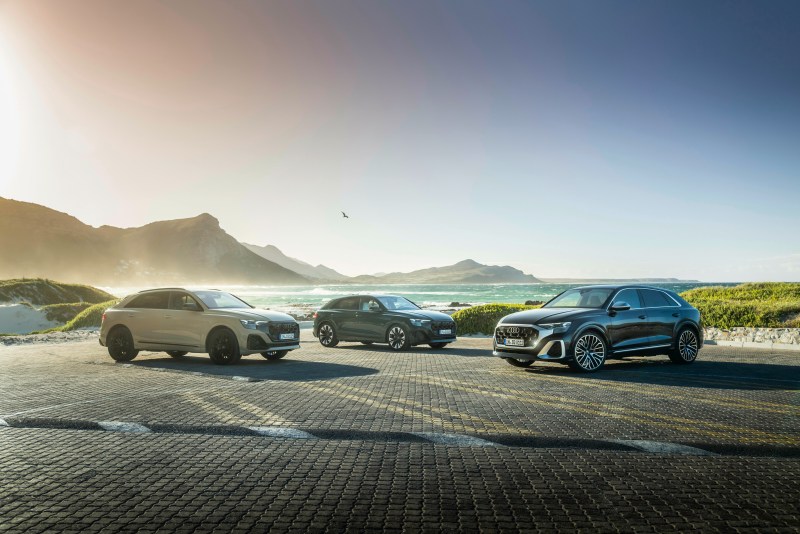
Both high-end SUVs certainly look similar from the outside and appear to be roughly the same size. But look beyond the surface, and you’ll see two very different vehicles with different use cases. One is more powerful and well suited to towing — while the other can transport more people and/or cargo. There’s also a very notable difference in price between the two vehicles. So read on as we unpack some of the key differences between the Audi Q7 and Q8.
With the premium models, the Q8 is more powerful
In terms of performance, the Q8 outshines the Q7 by a significant margin. Its engine, a turbocharged 3-liter V6, is always going to outperform the 2-liter I-4 they drop in the base Q7. You can get the same V6 in a Q7, but that involves springing out for one of the vehicle’s premium trims. You can also upgrade the Q8, and the RS version comes with a hefty 4-liter V8, which may make it one of the more powerful options in its class.
When comparing both base editions, the Q8 has 335 horsepower, which is significantly more than the Q7’s 261. There’s also a gulf in torque, with the Q7’s 273 lb-ft paling in comparison to the 369 lb-ft you’ll find in the Q8. In practical terms, this translates to 7,700 lbs of towing capacity in the Audi Q8, compared to just 4,400 lbs in the Q7. So, if you have a boat or trailer to tow, there’s an obvious choice.
The difference is also reflected in the vehicle’s 0-60 times. The 6.7 seconds offered by the base Q7 is respectable, but the Q8 has notably better acceleration. It hits the milestone in just 5.5 seconds.
If you need space, go for the Q7
Space is often one of the main reasons people will opt for an SUV over a sedan, and it’s also a major difference between the Audi Q7 and Q8. Despite the Q8 having a higher number in its name, the Q7 is actually the bigger vehicle by some margin. It’s only three inches longer than its counterpart and ever so slightly narrower, but we all know it’s what’s inside that counts.
If you have a large family or are responsible for taking half the team to soccer practice, then the Q7 is the obvious choice. It has seven seats available, as opposed to the Q8’s five. The seats in the Q7 come in a three-row configuration, and using the back row sacrifices storage space. Legroom back there is also less than ideal, but that’s a sacrifice you often make when using all seven seats in a three-row vehicle. The Q8, while it has fewer seats, is likely to be more comfortable for all on board.
Storage space is also better on the Q7, especially if the back seats are down. The vehicle has just under nine more cubic feet of space at the back than its sibling, coming in at 69.6 cu ft as opposed to the Q8’s 60.7 cu ft. So if you have a lot of shopping or large objects that need moving on occasion, the Q7 is your most practical choice.
The Q7 also has better fuel economy
While the Q7’s smaller engine may make it more sluggish and hamper its towing ability, but there is a notable upside to something with fewer cylinders. They tend to burn less fuel. The two-liter four-cylinder motor in the Q7 will net you around 19 miles per gallon in the city and 25 on the highway for a combined total of 21 MPG — according to the EPA. That’s notably better than the three-liter, six-cylinder option in the Q8, which nets 17 MPG in the city and 23 MPG on the highway for a combined MPG of 19.
The total difference is just shy of 10% — which doesn’t seem like a lot but could save you a few hundred dollars a year. Obviously, there are other factors at play here, including how often you drive and what you’re using the vehicle for. If you’re intent on using the extra space that the Q7 comes with, that extra weight may ultimately wipe out any difference in fuel economy. Still, it’s something to consider, especially during a period where gas prices can shoot north overnight.
There’s a price difference too

One of the most standout differences between the Audi Q7 and Q8 are the vehicle’s respective prices. The Q8 is significantly more expensive than its little brother. The Q8 has a starting MSRP of $73,700, while the Q7 starts at $59,500.
The difference is less apparent if you opt for the top-end trim, with the Prestige variant of the Q7 coming in at $75,100 while its Q8 equivalent costs $81,800 — just over $6,000 more. Whether this makes ramping up the options, your Q8 better value or means you’re better off splashing out on the top end Q7 totally depends on your needs and budget. Still, if budget is your primary concern, then the base Q7 is the obvious choice here.






